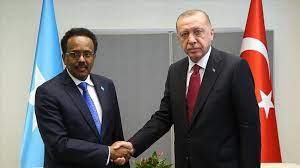
Turkey’s involvement in Somalia and its success, so far, is a novelty in Turkish foreign policy. Turkey’s efforts in Somalia have been significant for a number of reasons. First, they hugely invested in uplifting the humanitarian situation in Somalia, helped restructure and redevelop the Somali military apparatus for the long term and have played a role in Somalia’s return to the international forum.
For many years now, the UN peace keeping mission in Somalia has faced mixed reactions on its mandate to stabilize a country torn apart by war. A revitalized terrorist organization in Al-Shabbab carrying frequent attacks in the capital, many have questioned what exactly is the long term role of the UN peace keeping mission in Somalia?
These calls have increased pressure on the mission on why after so much money spent and there is little to show for it. There is no peace and worse no stable government. Such accusations against the mixed efforts of the UN peace keeping missions critics argue showcase the multilateral failure of international efforts to understand and delve deep to the core issues affecting Somalia.
This has seen the approach of the UN mission questioned from several fronts. Most interventions in Somalia have been multilateral affairs by international and regional actors. Turkey’s approach, in contrast, has been largely unilateral and highly coordinated that has reaped tremendous results so far.
In such a short time and space, Turkey’s humanitarian efforts, support in the rebuilding of Somalia’s security apparatus and the support for Somalia’s diplomatic efforts across the globe have yielded much more results than the UN could have showcased in all its years at the helm.
The common discussions that despite its good work across the globe the UN attempts to keep the status quo and simply calm the waters without having a long time plan for countries like Somalia, an international cash cow for NGO’s and the post war help that doesn’t address the real issues faced by the people often comes to the fore.
Somalia’s tribal arrangements make such efforts difficult. Yes. But Ankara’s success in such a short time in transforming both the humanitarian and security aspects of Somalia raises the questions of what the UN should learn from Turkey in Somalia. Somali military forces trained and equipped by Turkey are recapturing towns and villages previously held by the terrorist outfit Al-Shabbab raising hopes of Somali people to get rid of this scourge.
Long term, the Somali security will need to be safeguarded by somalis themselves, with a stable political climate for the time in many years, Turkey’s support in training Somali military forces to help keep the fight against Alshabab and defend their own country seems to have seen the light as even other western powers have joined the race to invest in long term security solutions like the British government opening up a military training centre in Somalia.

Ankara’s foreign policy towards Somalia is a mark of the fruits having a long term policy project in place rather than stops gaps along the way that do alter the Security threats that Somalia faces today from the Al-shabbab and the need for people based reconstructions. Not simply NGO powered multi-million projects that simply do not reach the people of Somalia.
Turkish aid organizations do not use local and international aid groups to guide them, which is the approach other countries take, instead Turkey directly approached Somalia. This has enabled Turkish aid organizations to receive accurate information and find structured solutions to the problems and questions that face the Somali people.
Somalia has been the scene of thousands of capacity building and self-help experiments funded by a plethora of international organizations and states. Yet it is precisely where these efforts have failed that Turkey has great success. Its risky nature of directly approaching the Somali people and government is reaping rewards for the Somali people.
Today, it is increasingly clear that Turkey’s involvement in Somalia is no longer just a matter of humanitarian aid; instead it is a political matter, which includes a nation-state rebuilding process. And so far that project is showing great results.

